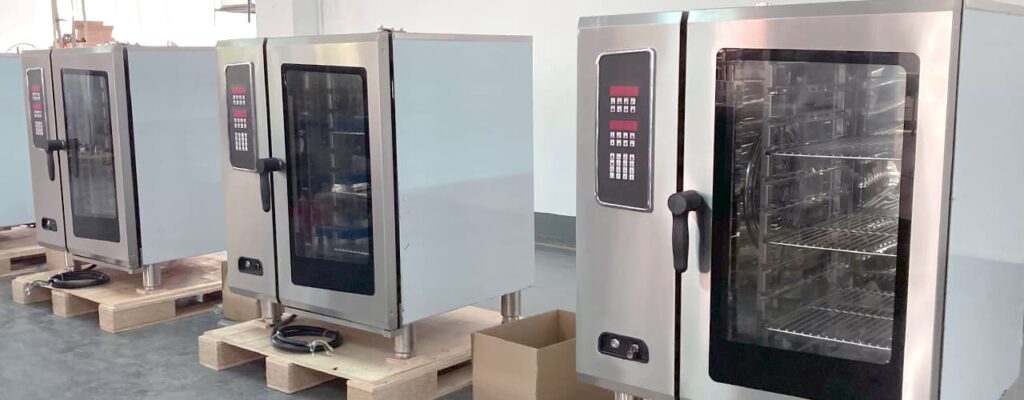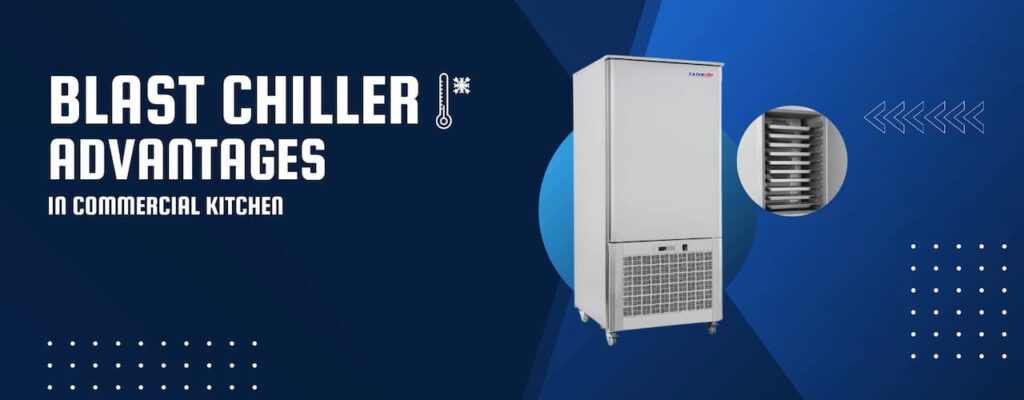Combi ovens have transformed the way we cook food. These versatile and efficient machines cook food quickly and evenly by combining steam, convection, and radiant heat. Because of their ability to prepare a wide variety of dishes with precision and speed, they are used in many commercial kitchens, from high-end restaurants to hospital cafeterias.
Benefits of Combi Ovens
Condensing Cook Line
The ability of combi ovens to condense a cook line is one of their most significant advantages. A combi oven can handle all of these tasks in one machine rather than having multiple pieces of equipment for cooking different types of food, such as a steamer, oven, and grill. This can free up valuable kitchen space while also streamlining the cooking process, reducing the need for staff, and increasing efficiency.
Cooking More with One Oven
Another advantage of combi ovens is their ability to cook more food with one oven. By combining steam, convection, and radiant heat, these ovens can prepare a variety of dishes simultaneously. For example, a combi oven can roast a chicken, bake bread, and steam vegetables all at the same time, without any flavors or aromas transferring between the dishes. This means that a kitchen can produce more food in less time, without sacrificing quality.
Precise Temperature and Moisture Control
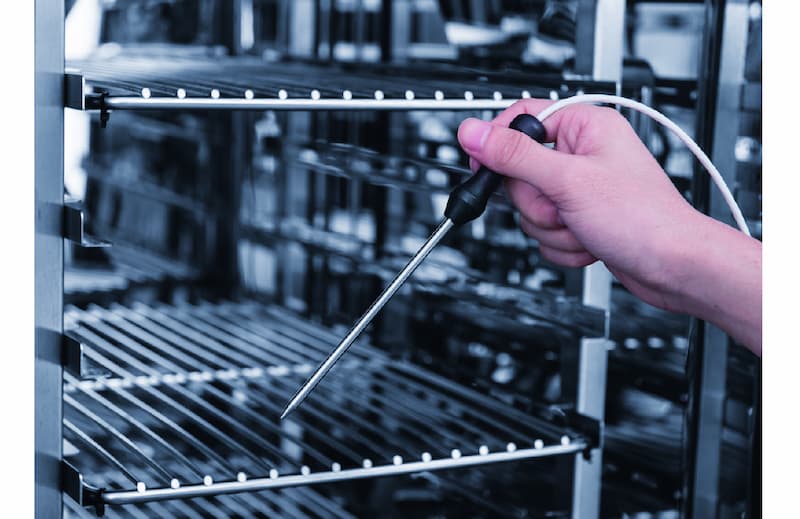
Precision temperature and moisture control are two more benefits of combi ovens. These machines use sophisticated technology to regulate temperature and humidity levels, ensuring that food is cooked to perfection. This level of control is especially important for delicate dishes like fish or souffle, where even a small variation in temperature or moisture can result in an inferior dish. With a combi oven, chefs can achieve consistent and accurate results every time.
Programmable Menus
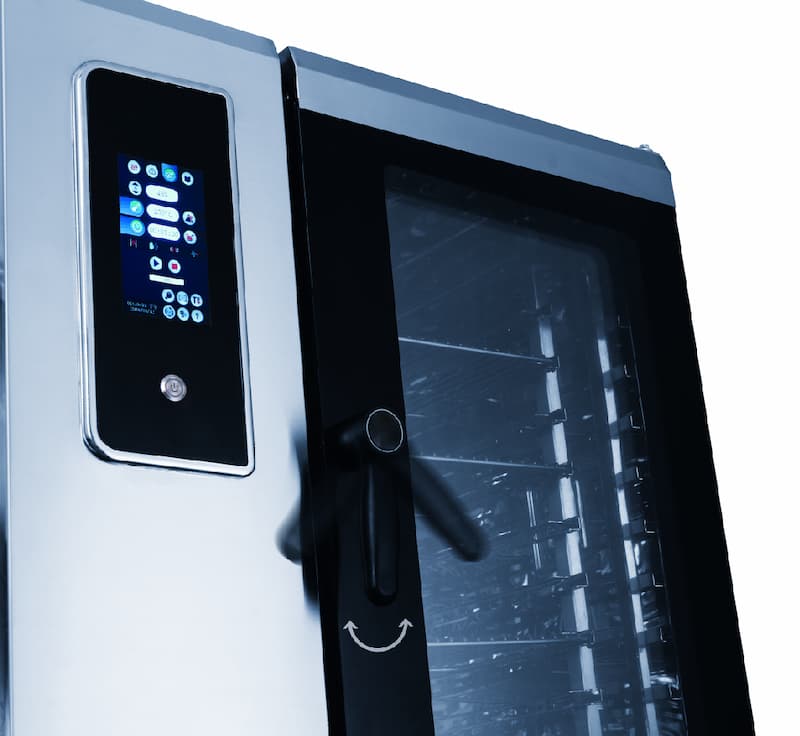
Programmable menus are a valuable feature of combi ovens in commercial kitchens. By pre-programming recipes and cooking cycles, chefs can save time and increase efficiency while reducing the need for manual intervention. This feature is especially useful in busy kitchens where time is of the essence. Moreover, it ensures consistent results, regardless of who is preparing the dishes.
Increased Food Yields
Another advantage of combi ovens is their ability to increase food yields. These ovens use steam to cook food without dehydrating it, resulting in less moisture loss during the cooking process. This leads to more food being produced from the same amount of raw ingredients. Furthermore, the even cooking process minimizes wastage caused by overcooked or undercooked dishes.
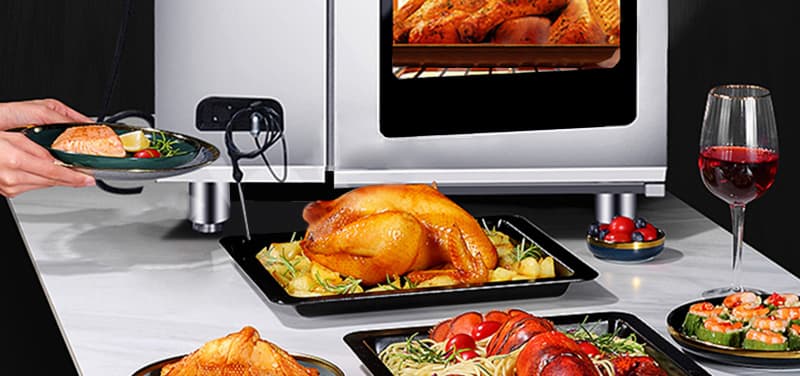
Three Modes of Cooking
Combi ovens use three types of cooking methods: steam, convection, and combination. The oven uses moisture to cook food in steam mode, which is ideal for vegetables, fish, and delicate dishes. Hot air circulates around the food in convection mode, which is ideal for baked goods and roasts. In combination mode, the oven cooks food using both steam and convection, which is ideal for dishes that require a crisp exterior and a moist interior.
Combination Oven Considerations
Electric vs. Gas Combination Ovens
When considering a combi oven, it is critical to consider several factors, one of which is whether to go with an electric or gas model. Electric combi ovens are more expensive to operate, but they provide more precise temperature control. Gas combi ovens, on the other hand, are less expensive to operate but may not provide the same level of accuracy as electric ones.
Programmability and Versatility of a Combination Oven
Another consideration is the programmability and versatility of a combi oven. Some models have touch screens that allow for easy programming and menu customization, while others use traditional dial controls. The type of control panel that works best for a kitchen will depend on the individual needs and preferences of the staff.
Boiler vs. Boilerless Combi Ovens
Boiler vs. boilerless combi ovens is another factor to consider. Boilerless combi ovens are less expensive and easier to maintain, but they may not provide the same level of moisture control as models with built-in boilers. On the other hand, combi ovens with boilers can produce more steam, which is ideal for dishes that require higher levels of humidity.
Combi Oven Sizing
Combi oven sizing is another important consideration. Mini combi ovens are ideal for small kitchens with limited space, while tabletop models are great for mid-sized kitchens. Floor models are suitable for large-scale operations, such as banquet halls or institutional kitchens. The size of the oven will depend on the volume of food that needs to be produced and the amount of space available in the kitchen.
Optional Features
Combi ovens can also be outfitted with optional features such as grease management systems, ventless hood systems, and UPC code scanners. Grease management systems reduce the amount of grease that builds up in the oven, making cleaning easier and lowering the risk of fire. Ventless hood systems do not require an external ventilation system, saving space and money on installation. UPC code scanners make it simple to program and manage recipes, increasing efficiency and lowering the likelihood of errors.
Combi Oven Maintenance and Cleaning
Maintenance
Maintaining safety is crucial when using combi ovens due to their production of high heat and steam that can pose a risk if not handled properly. To prevent accidents, it is essential to comply with all safety regulations and ensure that staff is adequately trained in the operation of the oven. Additionally, it is important to regularly maintain and sanitize the oven to prevent safety incidents and keep it in good working condition.
Cleaning
Routine cleaning and inspection of the combi oven are necessary to ensure that all components are functioning correctly. This process includes cleaning the oven interior, eliminating any debris or grease accumulation, and checking for indications of wear or damage. Regular maintenance can help prevent breakdowns and extend the life of the oven, resulting in cost savings and reduced downtime.
Conclusion
Recap of key points and benefits of using a Combi Oven
In conclusion, combi ovens are a valuable addition to any commercial kitchen. They offer numerous benefits, including condensed cook lines, increased food yields, precise temperature and moisture control, and programmable menus. There are several factors to consider when selecting a combi oven, including electric vs. gas models, boiler vs. boilerless, sizing, and optional features. Safety and maintenance are also critical considerations for ensuring the safe and efficient operation of the oven. With the right combi oven, chefs can prepare a wide variety of dishes quickly and efficiently, while maintaining the highest standards of quality and consistency.


